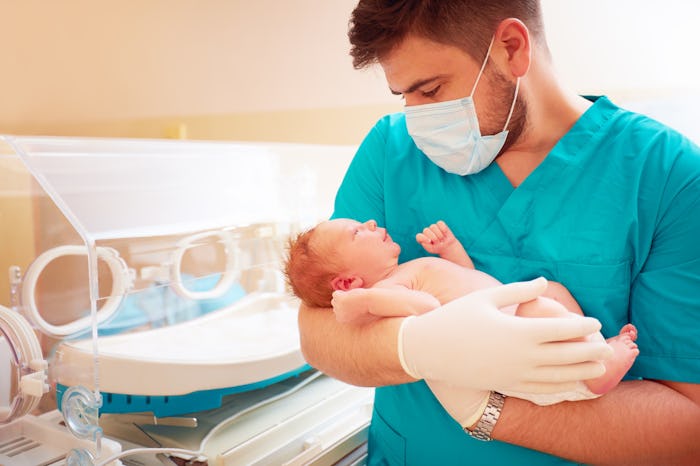Having a child moved into the NICU isn't easy on anyone involved. But it turns out that the transition home can also come with its own share of stress. While definitely an improvement over not having constant access to your child, the adjustment period can be particularly difficult for one parent. Dads of premies are more stressed out than moms when the family returns home, according to researchers.
In a groundbreaking new study, researchers at Northwestern University's School of Medicine evaluated parental stress levels during the often difficult transition between the Neonatal Intensive Care Unit (NICU) and their homes. By examining the levels of the stress hormone cortisol in mothers' and fathers' saliva, they determined that fathers are more stressed out than mothers during the transition period, according to Science Daily. All parents involved in the study had children with very low birth weights and were monitored for the two weeks following their discharge.
The study, published in the Journal of Perinatal and Neonatal Nursing, found that both parents had high levels of cortisol prior to being discharged, but fathers experienced an increase in their stress levels over the following 14 days at home, whereas mothers' levels stayed constant. Along with saliva tests, researchers also conducted paper surveys. Initial tests were given at discharge and they followed up at the one day, five day, and 14 day marks after coming home.
The study's lead author Dr. Craig Garfield, who is an associate professor of pediatrics and of medical social sciences at Northwestern University Feinberg School of Medicine, told Science Daily that the increased stress in fathers is likely due to increased feelings of personal responsibility:
Dad goes from a situation where the baby and mom are cared for by experts in the hospital to having to simultaneously care for his baby, partner and work. He is supposed to be the 'rock' for his partner but the stress can really set in.
Garfield also explained that initial stress is not a problem, but high stress levels as long as two weeks after coming home are "more concerning." Prolonged stress can wreak havoc on many parts of the body, including the cardiovascular system. Researchers also revealed a telling aspect of paternal stress: fathers's stress levels based on saliva tests were higher than their self-reported stress, a fact that researchers believe may indicate that fathers are unaware of how much stress they are experiencing, according to Northwestern Now.
In order for parents to minimize their stress and keep themselves mentally healthy, March of Dimes recommends keeping a routine — making time for a shower every day, eating regular meals, drinking plenty of water, and doing your best to get a good night's sleep.
Along with these recommendations, Garfield urges parents to communicate and help one another to take steps to minimize stress. For example, fathers should urge mothers to do things like spend time with their friends and get out of the house. But mothers should be doing the same thing, according to Medical Express:
Babies thrive when parents thrive, and if parents are stressed out, that can impact their parenting of the child, the relationship between the mom and dad and can alter infant attachment. This all is just much more pronounced with medically vulnerable babies leaving the NICU and going home with mom and dad.
The stress surrounding the birth of a premature baby has been linked to parental anxiety, depression, PTSD, and postpartum sleep disruption. While the impact on mothers has been more thoroughly explored, fathers are also impacted by the stress and transition associated with entering and leaving the NICU. Knowing more about how this kind of stress impacts both parents is key to helping effectively manage it.
Check out Romper's new video series, Romper's Doula Diaries:
Watch full episodes of Romper's Doula Diaries on Facebook Watch.
